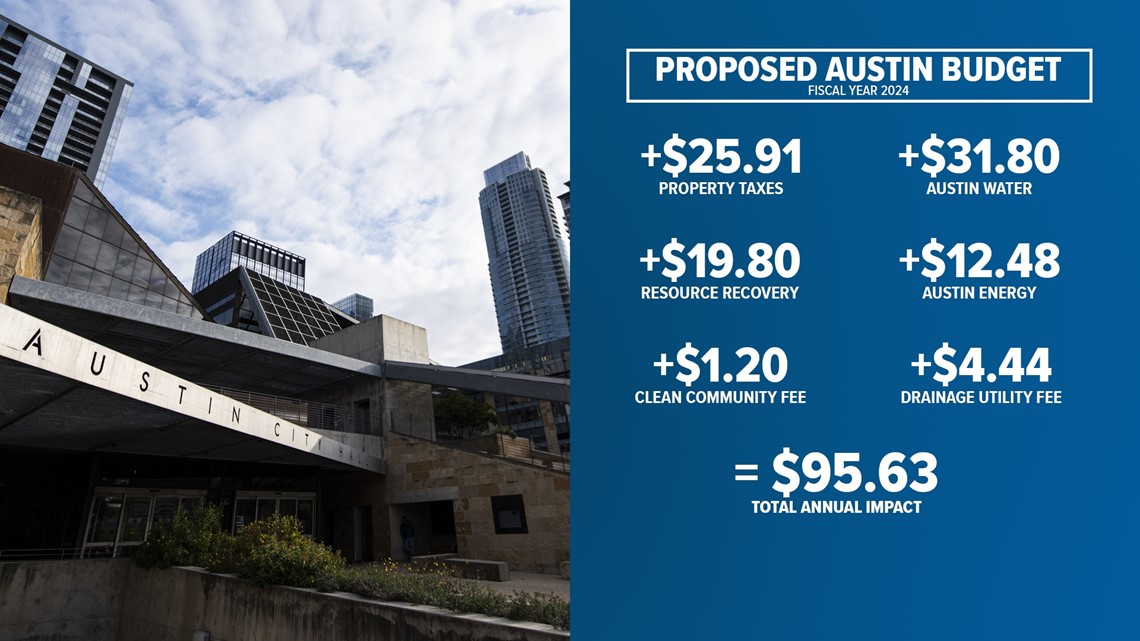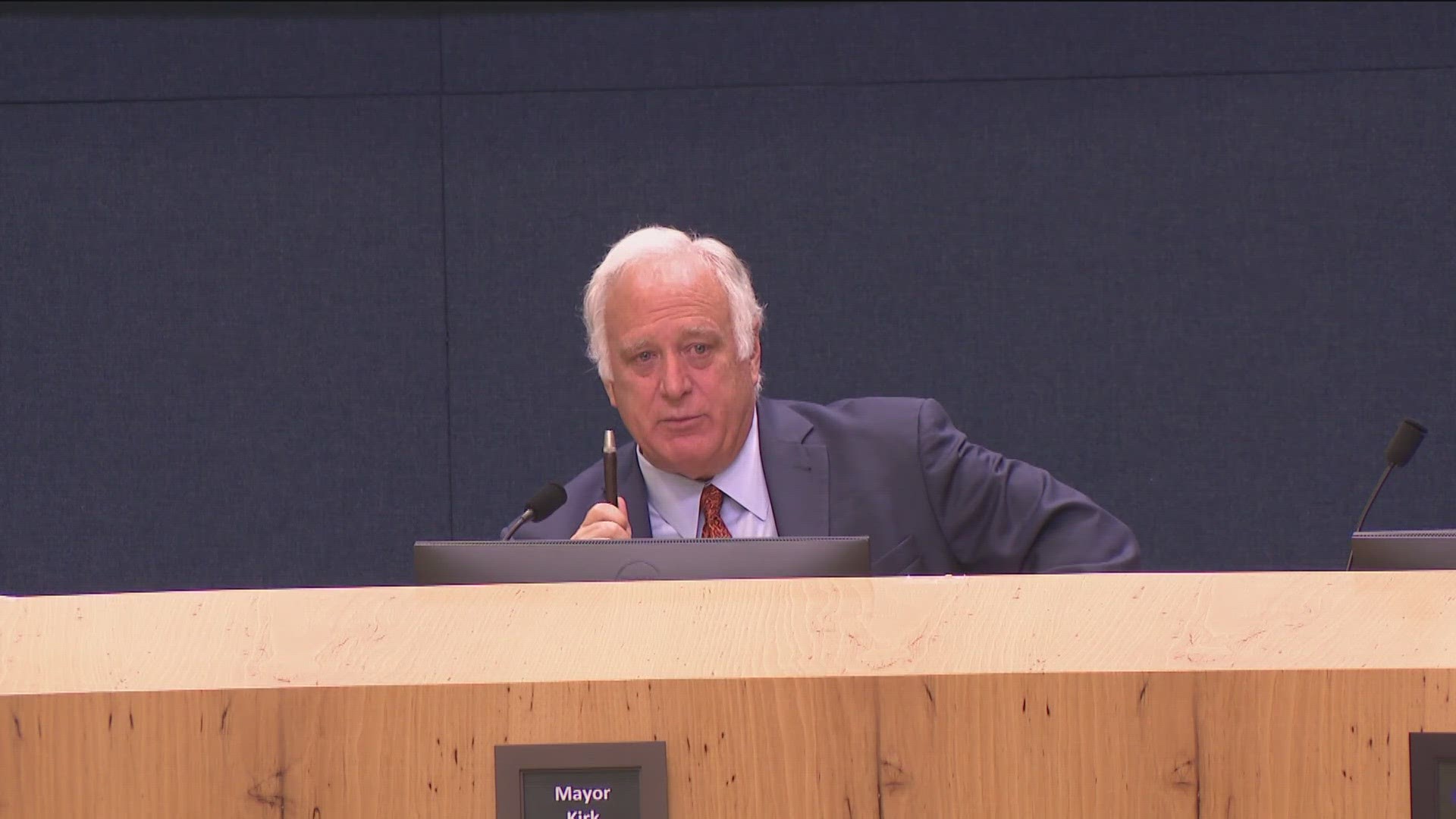AUSTIN, Texas — On Wednesday, Austin Interim City Manager Jesús Garza presented his recommendations for the Fiscal Year 2023-24 City budget, which he said aims to get “back to basics” and focus on “the core services our residents need and expect.”
The proposal also includes rate and fee hikes for Austin homeowners.
The budget proposes an across-the-board pay increase of 4% for civilian staff, including employees such as librarians, rec center staff, utility line workers, waste collection and road repair crews, community health professionals and more. Under this proposal, the City's living wage, or the minimum payable to any employee, would rise from $20 to $20.80 an hour.
Garza said annual pay for public safety employees will continue to be determined through union negotiations. The City is currently engaged in ongoing contract negotiations with the Austin EMS Association and an arbitration process with the Austin Firefighters Association.
The proposed budget would mean a typical homeowner sees an increase of $25.91 in the City's portion of their annual property tax bill.
But rate increases from Austin Energy and Austin Resource Recovery and hikes in the Clean Community Fee and Transportation User Fee will have Austin homeowners paying an average of $95.63 more a year. The 2% increase is based on a home worth $502,544. That number includes a 20% general homestead exemption.




During a budget presentation at City Hall on Wednesday, Garza said we need to look at the lack of affordable housing options in Austin.
Garza mentioned there will be an audit of the Housing Department to get a stronger grasp of how it is spending its money. He asked: is the department using its public dollars effectively and how can it develop a plan moving forward?
The budget proposes putting aside for affordable housing. The City anticipates spending more than $92 million for affordable housing options, which will come from bonds voters passed in 2018 and 2022.
The budget also includes investments to tackle affordability, like creating a revolving loan fund that makes it easier to create affordable housing developments and partnering with the Austin Economic Development Corporation to incorporate affordable housing into City redevelopment projects.
"The spending that's being done is to create more affordable units for the community, and it's evident of the work that's being done in the housing department, which is now a separate department when you look at where we're going forward in Fiscal Year 24," Budget Officer Kerri Lang said.
In regards to policing, more than $476 million is being proposed to set aside for public safety. It will fund 11 new civilian positions that will implement recommendations from the Kroll Report, an in-depth study following concerns about internal racism in the department.
Those new positions will improve and revamp the Austin Police Department's Cadet Training Academy, restructure recruitment efforts for APD by creating a commander position that oversees and focuses on recruitment and invest in research-based curriculum for APD's Cadet Training Academy, like hiring experts to change how we train the next generation of police officers.
"On the new hire side, we have a very aggressive incentive to try and bring new cadets into the academy, and they get an incentive payment for joining the academy, another incentive once they complete the academy and then a third incentive once they complete their field training," Chief Financial Officer Ed Van Eenoo said.
With hundreds of vacancies within the APD, the budget includes funding to incentivize officers to stay, like a 4% pay increase to officers and an additional 3% pay increase to officers who have worked for 23 years.
“We are ensuring we have the staff and resources necessary to keep our facilities like parks, libraries and recreation centers safe, clean and inviting; investing in emergency services to be able to respond more quickly and effectively to calls of medical distress; evaluating service delivery at the Austin Animal Center; and overhauling systems and processes to better serve Austin residents,” Garza said in his message included in the budget proposal.
City leaders said after “high volatility” following the COVID-19 pandemic and the subsequent inflation, Austin is now on track to see a projected 3.5% increase in sales tax revenue over last year's receipts.
Other highlights of the proposed budget include:
- $7 million to fund a down payment on the purchase of the currently leased space at the Ben White facility
- $6.1 million in one-time funding to contribute to the cost of equipping City facilities with generators to ensure power in the event of a weather emergency
- $5 million in the Housing Trust Fund to create a revolving loan fund aimed at lowering barriers of entry for creation of affordable housing developments
- $4 million, including new positions, to improve internal processes related to permitting and plan reviews, as well as expedite proposed changes in the land development code
- $3 million in one-time funding to update City comprehensive plans
- $2.7 million to support new positions and additional contract funding for enhanced security and cleanliness at parks, library branches, public health clinics and the animal shelter
- $2.5 million for a service agreement with the Austin Economic Development Corporation (AEDC)
- $2 million to increase the overtime budget of the Fire Department to reflect actual overtime cost trends
- $3.1 million for deferred and preventative maintenance of safety, public health, library and parks facilities
- $1.2 million to fund full-year operation of the Southbridge Shelter
- $1.2 million in one-time funding to conduct Phase D of the study by Kroll Associates, Inc., to review and evaluate the Austin Police Department (APD) on the extent to which forms of racism, bigotry, and discrimination are present in the protocols, practices, and behaviors of the APD. Phase D of Kroll’s review involves assessing APD employee emails and social media posts
- $1.1 million for the first phase of replacement of ZOLL monitor/defibrillators on City ambulances
- $1 million in Austin Energy’s budget to conduct a study regarding conversion of the overhead distribution system to underground
- $600,000 in one-time funding to mitigate displacement of small businesses.
The full proposed budget can be found on the City of Austin website.
Mayor Kirk Watson said there will be a deeper dive into the General Fund on July 26 and a deeper dive into the Enterprise Fund on Aug. 1.

